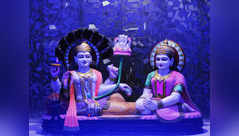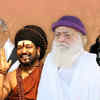5 shlokas from the Bhagavad Gita that help control anger
TOI Lifestyle Desk | ETimes.in | Last updated on - Jun 1, 2024, 11:00 ISTShare fbsharetwsharepinshareComments (0)
01/6Control your anger

Anger, an emotion that has forever led to conflict and ruin, can get uncontrollable at times. Anger can make people mad, can harm families, harm countries, lead to destruction, and in the end, there is never a winner! And just like the endless problems that the Bhagavad Gita has solutions to, there are solutions and revelations about anger as well.
Here we list 5 shlokas from the Bhagavad Gita that can help keep a check on anger.
02/6दु:खेष्वनुद्विग्नमना: सुखेषु विगतस्पृह: |वीतरागभयक्रोध: स्थितधीर्मुनिरुच्यते ||


Chapter 2, Shloka 56 of the Bhagavad Gita translates to - ‘A person who is not affected by distress, is free from desires for pleasures, and who is free from attachment, fear, and anger, is called a sage of steady mind.’
In this shloka, Lord Krishna tells humans about the importance of maintaining a steady and balanced mind regardless of how much anger must be boiling within. He advises people to remain undisturbed by both sorrow and joy and by not getting swayed by happiness or anger, one can learn how to be at peace with oneself and the world.
03/6कामक्रोधवियुक्तानां यतीनां यतचेतसाम् |अभितो ब्रह्मनिर्वाणं वर्तते विदितात्मनाम् ||


Chapter 5, Shloka 26 of the Bhagavad Gita says ‘Those who are free from lust and anger, and have realized the Self, for them, there is spiritual bliss both here and hereafter.’
In this shloka, Shri Krishna explains that being free from lust and anger is important to attain bliss in life. People who can control their desires and anger can easily achieve a state of inner peace and are in sync with their true self.
04/6अहिंसा सत्यमक्रोधस्त्याग: शान्तिरपैशुनम् |दया भूतेष्वलोलुप्त्वं मार्दवं ह्रीरचापलम् ||


Chapter 16, Shloka 2 of the Bhagavad Gita translates to ‘Non-violence, truthfulness, absence of anger, renunciation, tranquility, absence of fault-finding, compassion towards all beings, absence of greed, gentleness, modesty, and absence of fickleness are the qualities of divine-natured humans.’
In this shloka, Krishna gives out certain virtues and qualities that are important for good humans to have and indicate a certain divine nature. And among them all, the absence of anger is one of the most important qualities. Practicing non-violence, truthfulness, and compassion reduces the triggers that cause anger and when we accept these qualities in us, we make a more serene environment around us.
05/6त्रिविधं नरकस्येदं द्वारं नाशनमात्मन: |काम: क्रोधस्तथा लोभस्तस्मादेतत्त्रयं त्यजेत् ||


Chapter 16, Shloka 21 says ‘There are three gates leading to the hell of self-destruction: lust, anger, and greed. Therefore, one should give up on these three.’
By highlighting how anger can lead to self-destruction, this shloka shows people the ill-effects of bad temper. Anger, greed, and lust, don't just stop a person’s spiritual growth but also result in a bad environment in their own heart and mind. And so, to lead a fulfilling and peaceful life, it is important to abandon these traits.
06/6क्रोधाद्भवति सम्मोह: सम्मोहात्स्मृतिविभ्रम: |स्मृतिभ्रंशाद् बुद्धिनाशो बुद्धिनाशात्प्रणश्यति ||


Chapter 2, Shloka 63 translates to ‘From anger comes delusion and from delusion there is confusion of memory, and then there is loss of reason. From that, there is complete ruin.’
In this shloka, Shri Krishna explains the effects of anger. By explaining that anger leads to delusion, and then delusion transforms to confusion, which in turn results in loss of reason, it is like a hint into how humans lead themselves to ruin. Understanding this chain of consequences helps control anger.































































closecomments
SIGN IN WITH
GoogleEmail